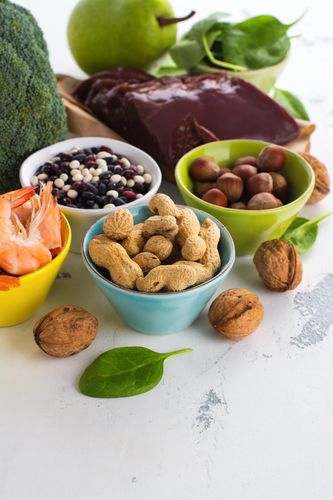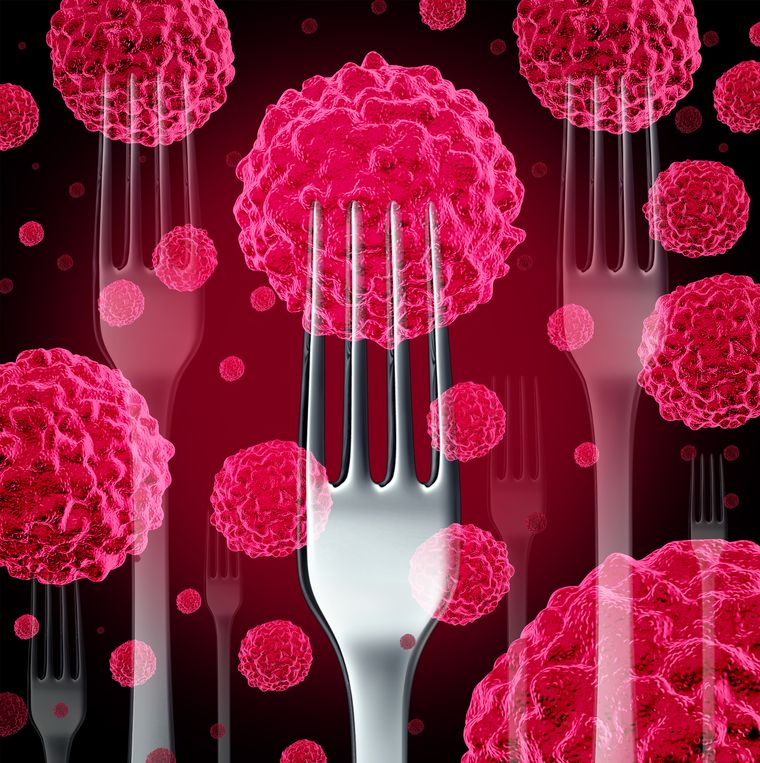Cancer is a dreadful disease. Worldwide, there are 14 million cases and about 8 million deaths due to cancer annually. This is despite the fact that 50 per cent of cancers are considered preventable. There are genetic and environmental factors for cancer that one cannot control. But there are preventable risk factors, too, like tobacco use and obesity. Dietary components and patterns have also been studied in relation to their risk of cancer. There are both causative and protective factors in the diet. But this is only an association and not a 100 per cent cause and effect relationship, which means one cannot be absolutely sure that consuming certain food will lead to cancer or prevent it.
Sugar and cancer
There is a general perception that sugar fuels cancer growth and makes it more aggressive. Sugar or table sugar is sucrose. It also exists in the form of glucose and fructose. As sugar chains get longer, they exist as polysaccharides. Our body breaks down these components in diet to basic glucose, which works as a fuel for all living cells. So, all living cells, and not just cancer cells, require glucose for growth. Cutting down on sugar drastically can lead to weakness. This is particularly important in cancer patients where the body is already under stress. Hence, nutritionally deprived diets may hamper their recovery or may be life-threatening.
The misconception has also been derived from the fact that PET scans use a form of radioactive glucose, which is picked up more by the cancer cells. Hence, people believe excess sugar spurts cancer growth. No research supports that sugar-free diet lowers the risk of getting cancer or increases chances of cure if one is diagnosed with cancer.
Eating excess sugar, however, can lead to obesity, which can indirectly lead to increased risk of cancer. Studies show that among five million people, a gain of 15kg was linked with a ten per cent or higher risk for colon, gallbladder, kidney and liver cancers. Hence, one should eat a balanced diet, comprising vegetables, fruits and whole grains. One should avoid pure sugars like cold drinks and other unhealthy food in general.
Artificial sugars
Multiple preparations of artificial sweetener are available in the market, like saccharin, aspartame and sucralose. They are substitutes for table sugar, which is multiple times sweeter than sucrose. So, with very less amount, they create same level of sweetness.
Does artificial sweetener cause cancer? In the early 1970s, saccharin was linked to development of bladder cancer in rats, but the mechanism implicated in rats was found to be irrelevant in humans. Aspartame was linked to increased risk of blood cancer in rats and so was sucralose. However, these effects were not seen in humans, hence they are approved for use. Acesulfame potassium, neotame and advantame are other approved sweeteners, but not to be used in meat and poultry.
Fat intake
Fat intake is related to multiple cancers directly and indirectly. A high-fat intake has been linked to increased risk of hormone-sensitive breast cancer. A low-fat diet has been found to be protective against pancreatic cancer. Moreover, increased fat intake might lead to obesity, which increases the risk of various cancers like breast (in women after menopause), bowel, womb, oesophageal (food pipe), pancreatic, kidney, upper stomach, liver, thyroid and ovarian cancers and myeloma (a type of blood cancer) and meningioma (a type of brain tumour). Fat cells act as a storehouse for energy, sending various growth signals to other cells. These signals may be in the form of increased insulin levels or production of oestrogen in post-menopausal women. Fat cells in excess stimulate immune cells to cause inflammation, which over a long time may increase the risk of cancer.
Dietary fibre and colon cancer
Dietary fibres are non-starch complex carbohydrates found in plant-based food. These are of two types—soluble and insoluble fibres. Soluble fibres form gel on ingestion and give a feeling of satiety (feeling of fullness of stomach). They have been found to promote colon health. They also have a protective role in diabetes mellitus and prevention of cardiovascular diseases. Soluble fibres can be found in apples, barley, citrus fruits, husks, legumes, oats, rye, and in vegetables like broccoli and carrots. Insoluble fibres do not form gel and form bulk of stools and promote bowel movement. They can be found in brown rice, fruits, legumes, seeds, wheat bran and vegetables such as cabbage.
Does dietary fibre prevent cancer? Numerous studies have shown that a high intake of dietary fibre, in particular cereal fibre and whole grains, have been associated with a reduced risk of colorectal cancer. Several mechanisms have been proposed to explain the hypothesis, including increase in stool bulk, dilution of carcinogens in the colonic lumen, reduced transit time and bacterial fermentation of fibre to short-chain fatty acids.
Studies suggest ten per cent reduction in risk of colorectal cancer for each 10g/day intake of total dietary fibre and cereal fibre and about a 20 per cent reduction for each of three servings (90g per day) of whole grains daily, and further reduction with higher intake.
Omega-3 fatty acids and fish consumption
Association of omega-3 fatty acids and cancer occurrence is inconsistent. Some studies show an increased risk while others show decreased risk. However, fish consumption has been found to be protective against colorectal cancer.
Calcium
Some studies show calcium is protective for colon cancer as it binds to bile and fatty acids. Excess intake is linked to higher risk of prostate cancer, hence it is recommended to consume in moderation—500mg to 1,000mg per day.
Meat consumption and colon cancer
Red meat and processed meat have been implicated with increased risk of colon cancer. Processed meat refers to meat that has been treated to preserve flavour by undergoing salting, curing or smoking. It includes ham, bacon, salami, chorizo and some deli meats. Risk increases by 17 per cent per 100g/day of red meat and by about 20 per cent per 50g/day of processed meat.
Antioxidants
Antioxidants neutralise free radicals and hence are beneficial in cancer prevention. Since cancer may develop over the years, it is not established for how long and how much amount one should consume to prevent cancer. However, one should consume antioxidants for general well-being and cardiovascular health. Rich sources are fruits and vegetables like carrot, spinach and tomatoes.
Bladder cancer and diet
Bladder cancer is the most common urinary tract cancer. The most common causes are smoking and occupational exposures to chemicals. However, dietary factors have also been implicated.
One of the important factors implicated is fluid intake. Adequate hydration dilutes urinary carcinogens and decreases their exposure time to bladder wall. Also, increased frequency of urination has been shown to decrease the risk of bladder cancer. More than 2.5 litre of fluid consumption has been found to be protective against bladder cancer.
Also, the components of water are to be considered. Chlorination is used to decontaminate general water supply. At higher concentrations, the byproduct—trihalomethane—has adverse effects. Hence, there is a permissible upper limit for chlorination in water supplies. Long-term consumption of chlorinated water has found to increase the risk of bladder cancer in men. Ozonation, a process to decrease trihalomethane content, has been found to be protective.
Other components in water like arsenic also have a cancer connect. Studies from Taiwan and Chile showed an aggressive bladder cancer in association with high arsenic levels. Removal of arsenic from water subsequently led to decrease in incidence of bladder cancer in these areas.
Vitamin D
Of late, there has been a lot of news regarding low vitamin D levels in general population and its association with various diseases. However, its role in association with cancer remains inconsistent. Overall, it does not appear that prescription of vitamin D supplements should decrease cancer risk.
Alcohol consumption
Alcohol consumption in any amount is associated with higher risk of cancer. About 3.5 per cent of all cancer deaths are linked to alcohol. Some countries issue alcohol packaging warning messages. One drink (10gm) increased the risk for cancers of the oropharynx, oesophagus, larynx, rectum, liver and breast. The overall risk for cancer increased by six per cent. Ethanol is broken down by liver into acetaldehyde. Increased duration of exposure and quantity of acetaldehyde is attributed to upper gastrointestinal cancer. Alcohol increases oestrogen levels and impacts folate metabolism. Alcohol may act as an irritant, causing increased cell production; as a transporter carrying carcinogens; as an inhibitor of DNA methylation.
Diets and cancer
A diet consisting of fat and protein and low on carbohydrates and sugar, the keto diet produces a state of artificial fasting, forcing the body to burn fat. This process, called ketosis, usually begins three to four days after eliminating carbohydrates from your diet. Keto diets have shown to slow the growth of cancer in rats. However, no conclusive data exists for humans, except for links showing the slowing of brain tumour growth in some cases.
Mediterranean diet (high intake of fruits, vegetables, nuts, legumes, whole wheat bread, fish and olive oil), a two-point increase in dietary compliance (on a 10-point scale), was associated with a 4 to 12 per cent lower risk of cancer. In a study of cancer risk and mortality, all-cause mortality was 17 per cent lower with a vegetarian diet. Diets that are high in ultra-processed foods were associated with greater than ten per cent increase in the risk of all cancers. Processed food includes packaged breads, packaged snacks, sodas, reconstituted meat products with nitrite preservatives, instant soups and frozen meals.
So, many cancers are preventable. Basic lifestyle changes prove to have a tremendous impact on the rate of cancer. General lifestyle recommendations include:
* Avoid tobacco
* Be physically active
* Maintain a healthy weight
* Consume a diet rich in fruits, vegetables and whole grains along with low in saturated/trans fat, red meat and processed meat
* Reduce alcohol consumption
Agarwal is consultant and unit head, medical oncology, Fortis Hospital, Shalimar Bagh, Delhi.




